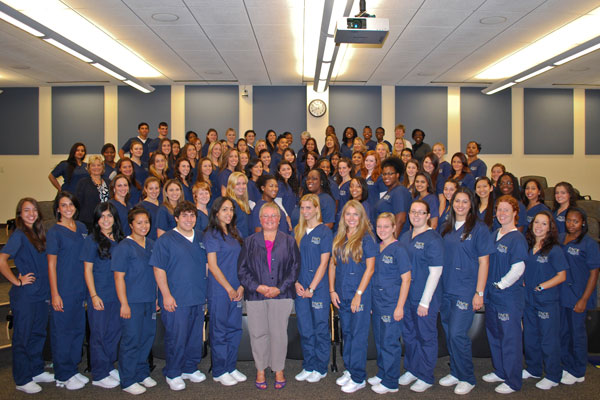Struggling Nursing Students Blame Department For Difficulties

Nursing 250 students gathered outside of Leinhard Lecture Hall to review for an upcoming exam last Tues. April 8. Many students currently enrolled in the Gerontological Nursing course feel that they are well on their way to failing and one student, Jasmine Giordini, even created a petition against the class; Giordini was unreachable for comment.
Other students, including junior Edwin Rodriguez, claim that the faculty and staff are to blame.
“Straight-A students are getting low B’s and a fair amount of students are on the cusp of failing,” said Rodriguez, who is a nursing major and a psychology and women’s gender studies minor. “I’ve spoken to many professors and even Dean Lisa, but they kept saying that I could do more; it makes it seem like something is wrong with me.”
Gerontological nursing is a class that explores the concepts of healthy aging and has a clinical on-sight lab component, in which students work in elder care facilities, or hospitals.
The students are split into two classes; one taught by Dr. Sharon Stahl-Wexler and the other by Dr. Stephanie Allen. Some students in Stahl-Wexler’s class feel that they are being graded more harshly than those in Allen’s half of the class. One student added that following a recent exam, Stahl-Wexler placed all graded exams face up on the desk, where the student saw “a lot of 63.87 percentages.” Any mark lower than 77 percent is deemed failing by the nursing department.
“Some people really worked hard right up until the test. When I hear from them that their grades were not even close to passing, I know how they feel. It’s kind of hard,” said one student, who is passing the course. “At one point I was one point away from a 77. You’re competing with yourself and you’re just like, what’s my other option if I fail?”
Senior nursing major, Lauren Alves, passed the class her sophomore year and agreed that students may have better success depending on which professor teaches the course.
“I didn’t study that much. My professor was awesome and the tests were fair. The papers were graded fairly,” Alves said. “I heard that one time a professor said ‘If I had graded this I would have given you a much higher grade.’ There’s a big difference in the professor so if the majority is failing then that’s insane.”
Before the exam review, Dr. Martha Greenberg, Associate Professor and Chairperson of Undergraduate Department for Lienhard, assured students that there are no discrepancies in the grading policies between the course’s two professors, and dispelled the rumor that 80 percent of the class is not failing. Greenberg added that those students who are failing or are not earning the grades that they want are not to blame the department.
“Education is a two-way street; the department provides students with many different resources and they must bear the burden of doing what they must do,” said Greenberg, who said that many students improved in their grades when they listened to the suggestions of the faculty and staff, which were as simple as completing the chapter readings. “There were some students who showed up to the first day of class with the shrink wrap still on their books.”
For the four-credit course, Greenberg said that students should be studying three hours per credit for every exam and assignment.
The nursing department also provides other resources such as exclusive tutoring for nursing students and one Saturday program in which a test-taking expert worked with students on time management, stress, math review, and National Council Licensure Examination (NCLEX) style questions. Every student was encouraged to come to the event, which was offered on two separate weekends to accommodate everyone.
Additionally, of the tests administered to the nursing students are constructed based on the NCLEX, which helps the department to see who is really fit for the program and will prepare students for the exam upon graduation.
To better help students feel more comfortable with the material, the department gives nursing students surveys to help faculty and staff gauge which areas need the most attention.
“We listen carefully and try very hard to address what [students] say. We are there for them and give them a proper audience to help them the best we can to be successful,” Greenberg said.
Despite the nursing department’s vast efforts in guiding its students to success, Rodriguez still felt that some of the questions on the exams were unclear and led to misinterpretation. He said that although the review was helpful, it was something that should have been done sooner.
“[The faculty and staff] were willing to go over the exam, but it shouldn’t have taken so much complaining from the students to accomplish,” Rodriguez said. “I did feel that the review was effective because we went over the different things we should focus on and the staff gave us good pointers.”
One of the nursing department’s main goals is to graduate successful students, according to Dean and professor of the College of Health Professions Harriett Feldman, and the rigorousness of the nursing program serves to graduate skilled and well-educated health care professionals.
Your donation supports independent, student-run journalism at Pace University. Support the Pace Chronicle to help cover publishing costs.
